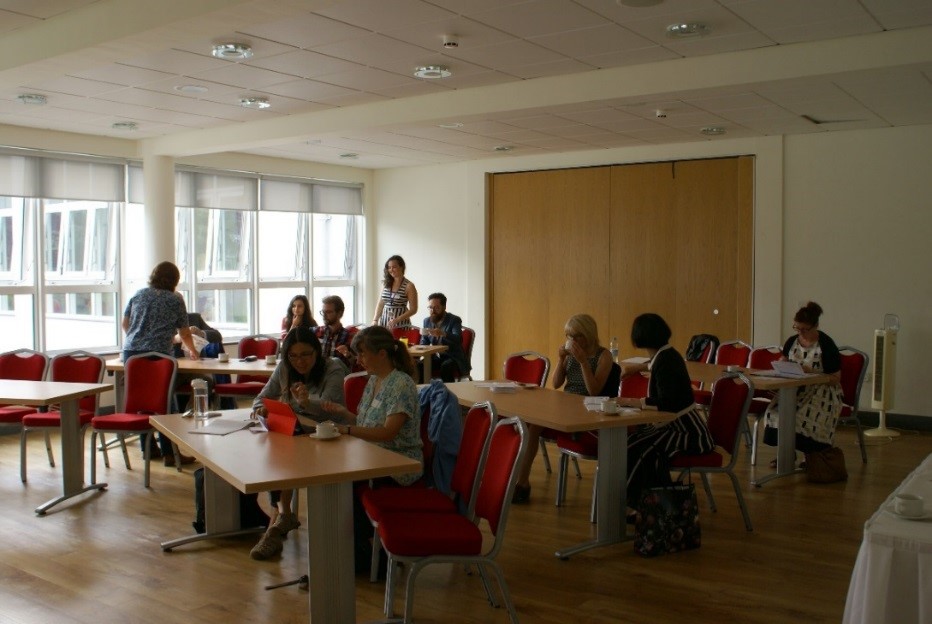Eleanor Johnston, Academic Skills Librarian at Staffordshire University, reports on the recent Library TeachMeet event that took place at their Stoke-on-Trent campus and was sponsored by the CILIP Information Literacy Group. The theme of the event was “Little things mean a lot: adding value to the user experience”.
On March 9th, 2016, Staffordshire University hosted a Library TeachMeet at the Stoke Campus. TeachMeets are an opportunity for staff to share innovations, experience and knowledge, and this is the latest in a series of TeachMeets that have been generously supported by the CILIP Information Literacy Group. We were joined by ‘presenters’ and ‘enthusiastic audience members’ gathered from across the country in person and, in a first for this series of events, via Skype.
Some notes on the event are available below (with thanks to Vicki McGarvey), and presentations and photos from the day are available on our event page.
Digital Champions at The Hive – Lauren Picker
- Gap between services and knowledge and skills – visitors need support and reassurance
- Using volunteers as range of champions that can relate to their peers.
- BE ONLINE: new starters get digital sessions – rolling 30 minute session
- Vesera modern day walkie talkie
- Training online modules for volunteers using learn my way – also includes data protection
- Challenges of working in a joint institute – public and HE
- Softer skills important too
Getting the library mobile without wheels: library outreach at MMU Cheshire – Sarah Webb
- MMU go out to the community / art department on the other side of the campus
- Open space for arts – free-flowing area not ideal space. Offered an alternative corridor and got a lot of through traffic. Brand name ‘library at the box office’
- Change presence according to time, postcards from special collections
- Academics will refer students
- 2 librarians, 2 iPads – meet on ‘their’ territory
- Built into timetable – don’t need wheels
- Staff perceptions of pop up saying students should go to the library – is there a conflict?
- Now regularly once a week in term time
Job searching and preparing for interviews: Using business databases to give you the edge – Francesca Cornick
- Warwick- give resources for finding jobs
- Students given tasks (and focus) for them to do
- Regular feature in the timetable
- What do next? Working with careers service, e.g. LinkedIn alumni – looking at what they do
- Mentoring re: LinkedIn
- Deloitte provide free information services
Little things mean a lot: adding value to the user experience with an automated library system – Helen Stocker
- Helen works at Theological College and her environment is very different from that experienced by many of us in HE. After not having a LMS, they Implemented OPALS, and they went to Africa to set this up – and did everything in 3 weeks!
- Partnering with the librarians, able to track books
- Could only use the search in the library – a card catalogue before
- Working together as a team – value your LMS links to info literacy
Student engagement at a distance using live Facebook chat: Nicola Beer
- Facebook events at the Open University
- Discussion using comments, bumps up to newsfeeds to let them know what is going on nearer the time of the event
- Need to constantly refresh
- FB does give analytics and the topic makes a difference
- FB seems to be used instead of Twitter by students
- Getting referencing out of Refworks was popular
The Queenwood Library mobile tour – Dina Koutsomichali (via Skype)
Used the Actionbound App in order for students to conduct a tour of the library and to interact, show understanding and learn.
Two members of the team (Dina and Craig) also made a YouTube video on how it works, which was shown before Dina herself spoke via Skype to answer audience questions.
Changing the Subject (Resource Page): Making your subject resource page the focal point when teaching & supporting students – Paul Biggs
Paul researched how guiding students directly to their subject page would affect usage statistics of their guides and specific databases. His subject areas (Social Work, Sport and Psychology) all showed increased usage, and Paul was able to guide students to relevant webpages, resources and databases. There were also marked increases in database use (sessions and full text retrievals), which was interesting as there were falls in other subject areas.

